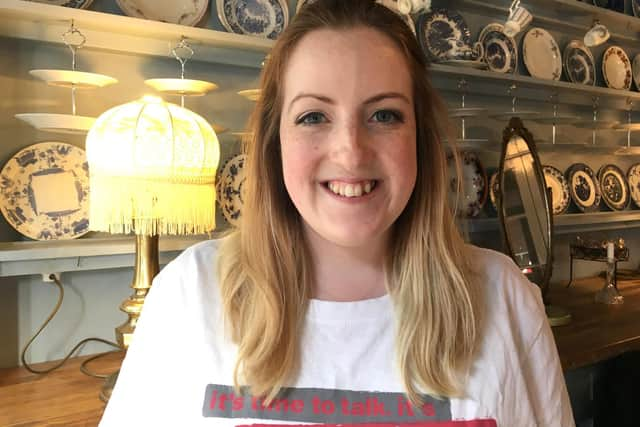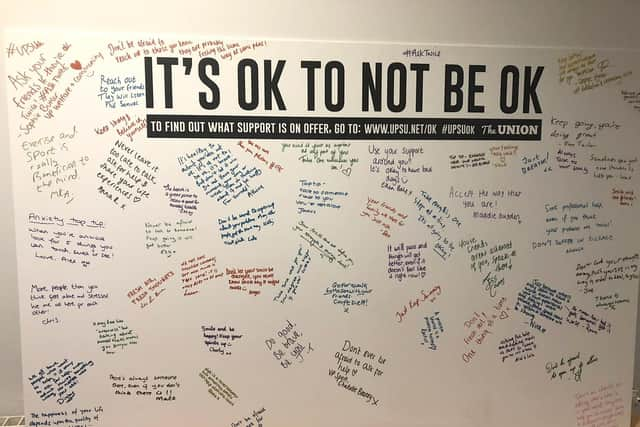Health in Mind: What it means to be a mindful employer


Workload, stressful deadlines and long commutes can make this seem worse. So now more than ever health experts and businesses are starting to consider the importance of maintaining a healthy work life.
This could be something as simple as being encouraged to take a full lunch break or feeling like your place of work is a safe space to share any worries you have.
Advertisement
Hide AdAdvertisement
Hide AdThe most recent results from the annual labour force survey, conducted by government, revealed that between 2017 and 2018 595,000 workers said they were suffering from work-related stress, depression or anxiety (new or long-standing).


And a total of 15.4 million working days were lost as a result.
This was up from 11.7 million working days lost and 500,000 workers suffering from stress, depression or anxiety in 2015-2016.
Employers are starting to realise the seriousness of mental health in the workplace, and the internationally-known Mindful Employer scheme has been at the fore of that movement.
Advertisement
Hide AdAdvertisement
Hide AdWhat started as an initiative for the Devon Partnership NHS Trust in 2004 has now spread across the UK and the world, with charters signed in Australia and New Zealand.


Companies that pledge to become a mindful employer are acknowledging that the mental health of their employees is a priority by signing up to training, information and resources and a staff helpline. Although signing the charter does come at a cost, it is possible to become a Mindful Employer and adhere to its doctrine without paying.
Mark Poole, Mindful Employer lead based at Devon Partnership NHS Trust, explained more. ‘It’s all about raising awareness and getting employers to think about the pressures their staff are under a bit more,’ he said.
‘Is there something they could do to help? For example, someone’s mental health might be improved by travelling into work slightly out of rush hour. It might not make a big difference to the company but it can have a big impact on an individual.’
Advertisement
Hide AdAdvertisement
Hide AdMark was buoyed by the fact that more than 2,000 employers have currently signed the charter. He said: ‘When I think back to 2004 no one talked about mental health. Mindful Employer was quite ahead of its time. As time’s gone on the stigma has reduced, it’s still reducing. People are being able to talk about it. For many of us the issue of mental in the workplace only started to be commonplace in 2012 as Mind and Rethink started to raise awareness of it.
‘It’s amazing how much Mindful Employer has grown. It started out as a scheme just for Exeter and the local area. Since then it’s gained momentum across the country and the rest of the world.’
Companies that haven’t signed the charter are still able to access the workshops which include general mental health awareness, being a mindful manager and keeping well at work.
The University of Portsmouth and its student union are both signed up to the Mindful Employer scheme.
Advertisement
Hide AdAdvertisement
Hide AdFor Sophie Butler, the vice president of welfare and community at the student union, signing up to the programme in 2015 had made a ‘huge difference.’
Every union employee is given a mindful induction when they start and a mindful buddy who they go to lunch with or take a walk together once a month to discuss how they’re feeling at work.
Sophie said: ‘We signed up because we had very little official support for employees and we wanted more in place.
‘The mindful buddy scheme has been so good. Once a month they go out for lunch or a walk. It’s usually someone we wouldn’t necessarily work with.
Advertisement
Hide AdAdvertisement
Hide Ad‘We also provides staff with access to the resources and regular time to talk sessions with cake. It’s more about breaking the stigma and getting people to talk. The feedback we have had from staff is that it has improved this and had an impact.
‘On a personal level it works really well for me. The other day I was in back to back meetings and my buddy lunch gave me an hour away from the office to relax for a bit. It’s so simple but it does make a huge difference to your stress levels.’#
The union also set up its own successful mental health campaign #UPSUok a few years ago, which is still going strong, that encourages students and staff to raise awareness of mental health issues around the campus.
To find out more about becoming a mindful employer visit mindfulemployer.net.
‘The mindful buddy scheme has made the biggest difference’
Advertisement
Hide AdAdvertisement
Hide AdSTUDENT union worker, Hannah Morton, never thought she would be able to talk about mental health at work, let alone get a job at one point.
Hannah, who works for the University of Portsmouth’s student union advice service, was initially scared to take medication for her mental health condition in case it could affect her job prospects.
The 28-year-old said: ‘I wouldn’t even consider going on medication because of the additional stigma. I thought it was going to affect me going to university or getting a job, which I know now is not true.
‘It was that self-stigma I didn’t want other people to feel like it ever. I had friends who didn’t quite understand, who said “why can’t I just get over it?”
Advertisement
Hide AdAdvertisement
Hide AdHannah was a student at the university before joining the advice service team, which boosted her confidence.
She said: ‘I really feel like I’m making a difference with my job. The whole uni experience can be so stressful - from studying and different pressures that come up with living independently for the first time.
‘Then there’s exam stress and the unknown of coming to the end of the year and thinking “what we going to do once we leave?” And they might even have issues with their housemates. Students can get isolated as well.’
Working for the advice team Hannah found out about the Time to Change movement and became a champion, spreading the word about ending mental health discrimination and learning more along the way.
Advertisement
Hide AdAdvertisement
Hide AdThe mental health blogger said: ‘The main thing for me was taking part in the Time to Change Story Camp, that opportunity was just amazing. It taught me how to share my story with others and how to start writing a blog. It’s so important that we can share how we’re felling without worrying about how people will react. I just love everything I do now.’
She praised the Mindful Employer scheme in her workplace.
‘It’s great that people are given an induction about mental health,’ Hannah said.
‘But for me the mindful buddy scheme makes the biggest difference. Being able to talk to someone in the office outside of a work environment is so helpful. It makes you realise that you’re not alone at work.’
The Labour Force Survey in 2017/18 revealed:
- 595,000 workers were suffering from work-related stress, depression or anxiety (new or long-standing)
Advertisement
Hide AdAdvertisement
Hide Ad- 15.4 million working days were lost due to work-related stress, depression or anxiety
- The average prevalence rate for work-related stress, depression or anxiety across all industries was 1,320 cases per 100,000 workers over the three-year period 2015/16-2017/18
- Education was the highest industry for his with 2,100 cases per 100,000 workers
- Between 2015/16-2017/18 the average prevalence rate for work-related stress, depression or anxiety per 100,000 workers was 1,370 cases for men and 1,950 cases for women